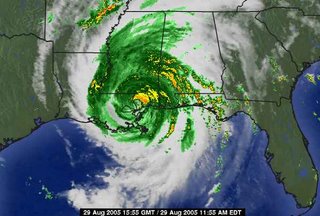Wrapping up... Last post from Blogger Jared Williams
I’ve been talking to Thomas, the MPB Webmaster, for a couple of weeks about doing a follow-up blog for my whole experience. It’s not exactly for the whole “anniversary of Katrina” hoopla, but it has just worked out that way, so I’ll take this opportunity to look back and review a bit.
First of all, let me give you a personal update. I have moved to Philadelphia, PA, and am celebrating my one week anniversary here today. When I moved back to the South from California, I was living in Baton Rouge. After the storm, the population of Baton Rouge doubled and the job market is fierce to say the least. I have a Master’s degree and a roommate who works at LSU, but found myself applying for entry-level jobs and competing with dozens of other candidates who also had MA’s or even PhD’s and connections as well. I found a temp-job at a large bank doing data entry for not a lot of money and was pretty miserable. I write this to give you a personal example of what the region affected by Katrina is like one year later.
It is frustrating.
It is frustrating almost to the point of defeat.
When I finally was able to return to Pascagoula and see my family’s progress, I had an immediate jumble of mixed emotions. Our house is making progress and should be livable in a couple of months, but you would not know this from the outside. My neighborhood is still filled with FEMA trailers and life there is still stunted at best.
The progress is internal and slow, this is true of both Pascagoula as a city and as a people. The work of rebuilding houses and lives is moving on, but it doesn’t look like much is going on. The Coast is still in a liminal, or “in-between” stage, and its people are bearing enormous stress and pressure. It’s not completely broken, but it’s still dysfunctional. People have developed new routes to work or routines to just get around, but there seems to be almost no direct path from point A to point B.
I don’t mean this simply as obstructions to streets, I mean that every trip requires mental calculation before and afterward. Part of the fun of driving a car or writing or any learned activity is when you reach that point of doing it but not thinking about it. You shift gears, stop, put on your blinker, fiddle with the radio, but you don’t really “think” about it, you just do it. Your mind can take on the task of thinking about other things, like going over that time in second grade you told all the kids about Santa because your mom never wanted to lie to you, but it just made you socially awkward for that week, and probably for the rest of your life.
I digress, but that’s my point. We’re built to dream and daydream, to wonder about life, about what is past and what is future, but that’s been gone from the Gulf Coast for a while. The formerly simple business of living takes all of one’s attention today. There’s no time to daydream when you have to wonder if the store will have everything you need. Is the store even there any more? Will you need to make another trip? Will you have to take the forty-five minute drive out to Mobile? Do you have a backup plan? A truck? Do they deliver to your area anymore? Should you just stay home and take a nap and avoid this altogether?
This is the life of post Katrina areas. Frustrating.
I’m spreading the word up here in Philly about how much help is still needed, so I’m asking you to do the same. It doesn’t have to be anything huge, just don’t let people think it’s a situation that will solve itself. Most of the coverage I’ve seen is doing a good job at reminding people of the need, but we need to understand that the entire infrastructure was wiped away, not just a house here and there. A year later, things are progressing, but it’s slow and precarious to say the least. The people are working to rebuild, but they need as much encouragement as they do physical help. Let’s not forget to call, to send what we can and to remind them that hope is ever-present, even when not ever-visible.

